SINGAPORE - By working together in partnership, the Government and Singaporeans can achieve much more to build the nation and emerge stronger from the Covid-19 pandemic, said Dr Maliki Osman.
Dr Maliki, who is Minister in the Prime Minister's Office and Second Minister for Education and Foreign Affairs, was speaking at a Singapore Together Emerging Stronger virtual conversation on Saturday (Aug 15) - the fifth in a series of 12 such public discussions to be held between June and October.
He said in his opening remarks that the Covid-19 crisis is an opportunity to reflect on what Singaporeans have learnt, reimagine the Singapore they desire, and emerge stronger.
"It is a whole-of-nation effort, which will take our collective energies and ideas to do well," he said, adding that the conversation topics are deliberately kept broad so as to give everyone the space to raise issues they care about the most.
Saying that the Government does not have a monopoly on ideas, Dr Maliki added: "We hope to hear from as many Singaporeans as possible... and we want to embrace all the possible ideas and solutions that will bring Singapore forward."
Each of these conversations - part of the broader Singapore Together movement, where the Government and Singaporeans partner one another to co-create policy solutions - lasts around two hours, and involves 40 to 50 participants from diverse backgrounds.
The conversations are hosted by political office holders. Other hosts to-date include Deputy Prime Minister Heng Swee Keat and Minister for National Development Desmond Lee.
On Saturday, the participants spoke about the kind of resilient Singapore they hoped to build, among other issues.
Some expressed concerns over rising retrenchments and said there should be less reliance on foreign labour.
Others highlighted Singaporeans' spirit of volunteerism, and said this is an opportunity to move towards a kinder and greener society.
Ms Yeo Miu Ean, who completed a degree in gerontology at the age of 57, said those in their 50s and 60s should embrace on lifelong learning in order to cope with rapid technological change.
"I hope workplaces will provide relevant training, especially on inter-generational dynamics in relationships, communication, working styles, and the use of technology," she said.
Mr Avinder Singh said the self-employed are "particularly vulnerable, as many do not have Central Provident Fund savings".
The 45-year-old, who is self-employed, suggested having more government-led schemes for matching CPF contributions, to incentivise this group of workers to save for their golden years.
At a virtual interview after the session, Minister in the Prime Minister's Office Indranee Rajah said that the pandemic has led to "one big global pause", with Singaporeans, too, having had to make big adjustments and rethink their priorities in life.
Said Ms Indranee, who is also Second Minister for National Development and Finance: "As a country, we also have to think about the kind of society we want to be, the values we hold, and what anchors us.
Quoting one of the participants, Ms Indranee reiterated that no impact is too small. "There are many things that people can do, and do it with the Government."
Amid a contentious online space and the rise of "cancel culture", Singapore should aspire to be a place where people can hear each other out "without savaging each other", she said.
One way is to create platforms where people can feel free and safe to speak openly despite their disagreements.
As key themes emerge from these conversations, Singapore Together Action Networks - partnerships involving people from the government, community and businesses - will be formed to create and deliver solutions.
The number and composition of networks will be determined by the issues surfaced and the actions needed.
Some networks have already been formed, including ones that help disadvantaged students, support vulnerable families and address mental well-being among young people.
Members of the public who are keen to participate in subsequent conversations may visit this website.
They can also share their reflections and aspirations here.












